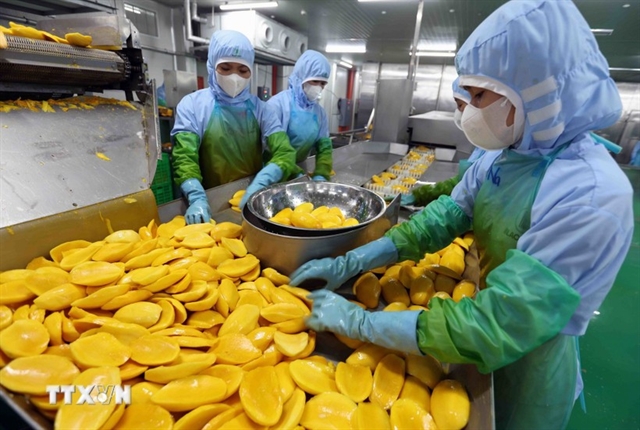 Economy
Economy


|
| Workers process agricultural products for export. VNA/VNS Photo |
HÀ NỘI — The US-based website ainvest.com has run an analysis praising Vietnam’s impressive economic performance, citing its gross domestic product (GDP) grew an estimated 8.23 per cent in the third quarter of 2025, despite the impacts of US tariff policies and adverse weather conditions.
According to the article, which was published on October 5, industrial output expanded by 10.8 per cent, driven by a strong recovery in the electronics, textile, and post-pandemic service sectors. Foreign direct investment (FDI) in the first half of 2025 reached US$21.5 billion, with 56.5 per cent channelled into manufacturing and 19 per cent into electronics. Renewable energy and digital industries have also drawn increasing global investor interest, thanks to government incentives and improved infrastructure.
Despite lingering risks related to tariffs and climate, Việt Nam’s 7.85 per cent GDP growth in the first nine months of 2025 reflects its resilience through policy reforms and economic diversification, ainvest.com noted.
The article attributed the strong growth to three key sectors, namely industry, agriculture, and services. Industry and construction contributed 9.46 per cent to GDP growth, supported by a 10.8 per cent rise in industrial production. Manufacturing, which accounts for 24.43 per cent of Việt Nam’s GDP, continued to play a leading role, particularly in electronics, machinery, and textiles. The services sector contributed 8.54 per cent to growth, fueled by the recovery of retail and tourism following the COVID-19 pandemic. Even the agriculture, forestry, and fishery sector - often vulnerable to climate shocks - made a 3.74 per cent contribution, supported by 3.56 per cent growth in aquaculture.
According to UK-based property consultancy Savills, FDI inflows to Việt Nam reached their highest level in five years, totaling $21.5 billion in the first half of 2025. Manufacturing made up 56.5 per cent of total registered capital, with electronics and machinery dominating.
Electronics, computers, and optics alone accounted for 19 per cent of new FDI projects, equivalent to 99 new projects. As the backbone of export-driven growth, the machinery sector is also attracting investment as companies seek to leverage Vietnam’s affordable labour force and diversify supply chains.
Renewable energy has also emerged as an investment hotspot. US financial analytics firm S&P Global reported that with electricity demand projected to rise by 12–13 per cent in 2025, Japan’s Shizuoka Gas and Germany’s PNE Group are investing in solar and offshore wind projects, respectively. S&P Global added that Việt Nam’s efforts to streamline approval procedures and expand tax incentives for green energy are accelerating this transition.
Meanwhile, digital services and logistics are gaining momentum. Investors are increasingly favouring ready-built factories, accounting for 54 per cent of new projects in the first half of 2025, according to Savills, to shorten time-to-market, particularly in electronics and packaging. Government reforms promoting digital administration, along with tax incentives for artificial intelligence (AI), fintech, and cloud computing, continue to enhance Vietnam’s investment appeal.
Citing Reuters, ainvest.com highlighted that Việt Nam’s growth is underpinned by structural reforms such as the “Đổi mới 2.0” initiative, which aims to boost capital formation and digital infrastructure. For investors, the key is to focus on sectors where Vietnam holds both competitive advantages and policy support, such as high-tech manufacturing, renewable energy, and digital services.
The article concluded that Việt Nam’s robust third-quarter growth reflects its strategic position in the global value chain and proactive policy framework. — VNS




